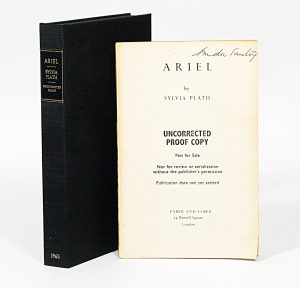I remember the first time I read Ariel. I remember the way in which the rented library book felt on my hands: too sticky, not dusty enough, cold. To this day, it is the the final four lines of its titular poem that ring in my head:
The dew that flies
Suicidal, at one with the drive
Into the red
Eye, the cauldron of morning.
Soon after this compilation was published, a flurry of criticisms rose to the fore. In 1966, New York Times reviewer Thomas Lask wrote that “Sylvia Plath reveals feelings that are bitter,tormented, unappeasable.” Samantha Miller of University of Nebraska echoes this critique, explaining that “Sylvia Plath’s final collection of poems, edited and published by her husband after her death, is remembered for its haunting subject matter.”
These two critiques reflect a larger countervailing trend of Plath criticism; her biography of mental illness and marital strife is used as the one and only conceptual frame with which to understand her work. Ariel is loud, frantic, crying. It is (partially) the story of a woman deep in the throes of psychosis. Yet too often, however, critics point to Ariel as some kind of obvious signal of Plath’s mental instability, a clear and irrefutable marker of her demons. Yes, Plath was a tortured soul. But this anthology–which is arguably her best–is complex in meaning and multi-faceted in it emotional drive. To ignore the ambiguity in her work, to close off space for alternate meanings of Ariel, is to do injustice to the remarkable poet that Plath was, and continues to be.
To make my case, I will return to the verse that I just cited.
The dew that flies
Suicidal, at one with the drive
Into the red
Eye, the cauldron of morning.
I am struck by the burning and bright quality of what morning is, by the ways in which the lines seem to trip on each other, by the possibility that dew can be Suicidal. I hope for what morning can bring, and I dread the deadly speed at which dew flies. I know that the “cauldron of morning” can bring all the promises of a new day, and can stir up all that is bad but unavoidable when morning comes around. And, these four lines are everything, all at once: hurting, fervent, fleeting, hopeful. To choose one reading over another is, well, to see only a fragment of a larger, much more beautiful puzzle.
*************
Teachers and friends have named “Ariel” and “Lady Lazarus” as their favorite poems in the collection, but mine will always be “Tulips”. I remember reading the poem and thinking–these tulips seem hungry. They hunger for sun, for skin contact, for the very possibility to be looked at. As hunger so often does, they are burdensome, they “weigh down.” And perhaps it is Plath’s hunger–and the very complicated nature of hunger itself–that makes her poetry so complex and so hurting and so melodious. Hunger: a lack of nourishment, a feeling of having missed something. Hunger: a desire for fullness. It is okay to let Plath’s biography filter through the pages of Ariel. But, it just as okay to let our own bodies and brains guide our reading experiences. I think we pay tribute best to Plath–to the loud, unapologetic, and individual writer she was–when we choose the second route. I leave you with a last poem: it is a taste on the tongue of something wonderful.
The tulips are too red in the first place, they hurt me.
Even through the gift paper I could hear them breathe
Lightly, through their white swaddlings, like an awful baby.
Their redness talks to my wound, it corresponds.
They are subtle: they seem to float, though they weigh me down,
Upsetting me with their sudden tongues and their color,
A dozen red lead sinkers round my neck.
Nobody watched me before, now I am watched.
The tulips turn to me, and the window behind me
Where once a day the light slowly widens and slowly thins,
And I see myself, flat, ridiculous, a cut-paper shadow
Between the eye of the sun and the eyes of the tulips,
And I have no face, I have wanted to efface myself.
The vivid tulips eat my oxygen.
Stay hungry, Plath fans.
by: Abigail Haber
Want a copy of Ariel for yourself? Check this out!

